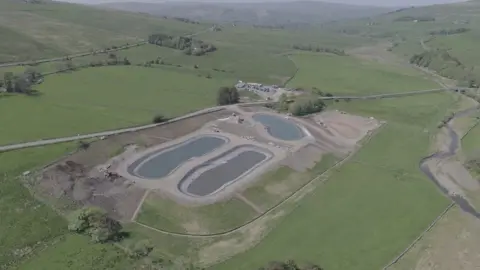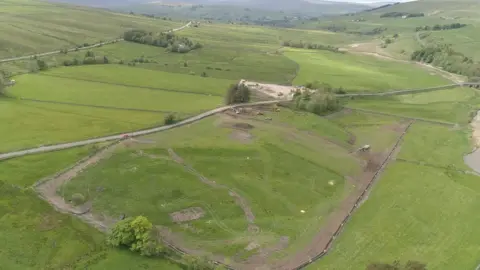North East and Cumbria river metal pollution tackled by £9m scheme
 Defra
DefraA £9m water treatment scheme to remove metal pollution from rivers in the north-east of England and Cumbria is due to be completed next year.
Contamination from old metal mines has left the River Nent in Cumbria with very high levels of cadmium, lead and zinc, which are toxic to wildlife.
Construction of the Nent Haggs Mine Water Treatment Scheme began in 2020.
Dr Hugh Potter from the Environment Agency (EA) said it will make a "vital" difference.
"This project will have an immediate impact on water quality in the rivers Nent and South Tyne and, in future, will help improve sediment quality in the Tyne estuary," he said.
Most metal mines in the north of England closed by the early 1900s but have filled with rainfall, with contaminated groundwater then polluting nearby rivers.
This problem affects about 1,500km (930 miles) of waterways in England and the government has said it wants to halve that number by 2038.
 Defra
DefraThe River Nent is the most metal polluted river in the north of England, with levels more than 200 times what is considered safe, the EA and Coal Authority said.
The watercourse has half the number of fish and river flies as would be expected if there was no pollution.
The Nent is a tributary of the River South Tyne, flowing to the River Tyne and then the North Sea, so the metals accumulate in Tyne estuary sediments.
One of the most significant sources of pollution is the Haggs adit, an abandoned mine water drainage tunnel at Nentsberry, which discharges about three tonnes of zinc each year, the EA said.
The Nent Haggs treatment scheme will capture the water as it comes out of the mine and remove about 90% of the metals via treatment ponds and reed beds at West Foreshield.

Follow BBC North East & Cumbria on X (formerly Twitter), Facebook and Instagram. Send your story ideas to [email protected].
